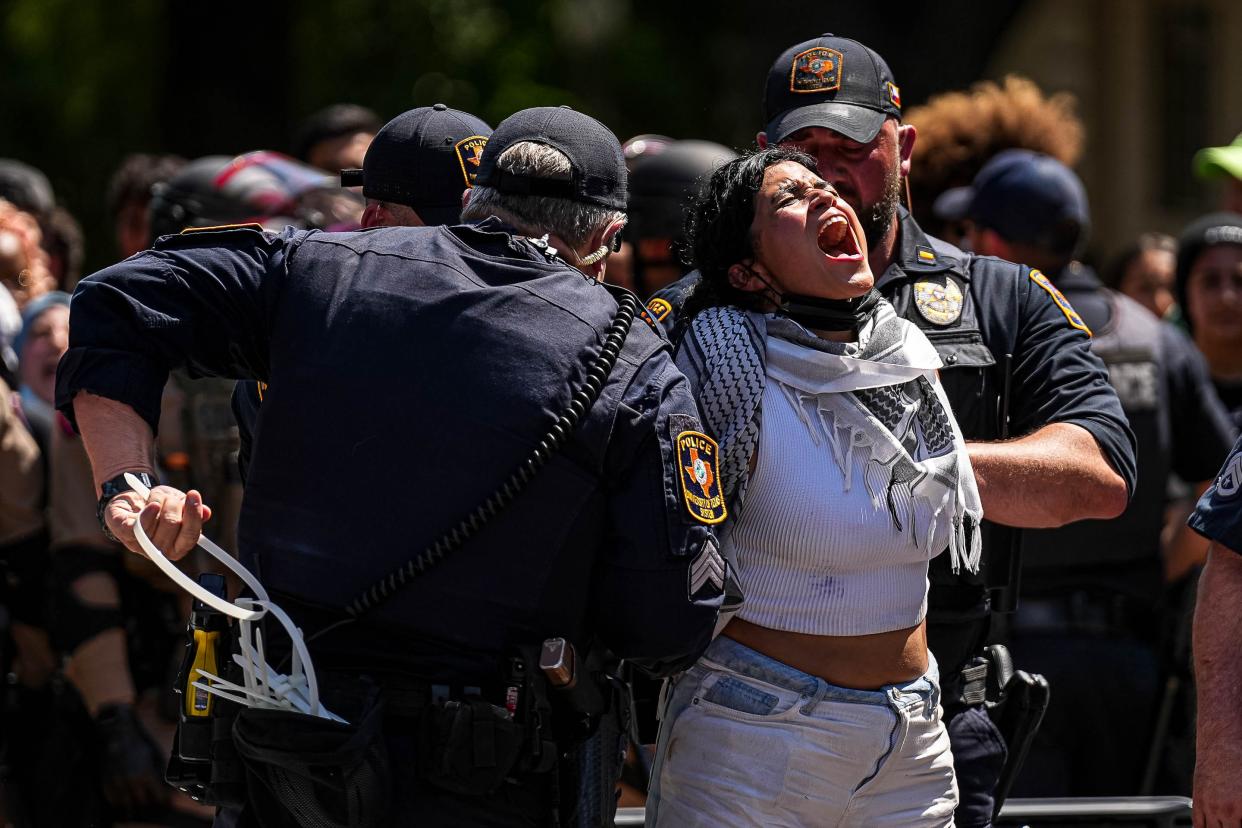UT Austin took wrong approach with crackdown on protests, trampling free speech | Editorial
The scenes from the University of Texas were shocking: police in riot gear, pawing horses, dozens of state troopers – and unarmed student protesters in T-shirts and shorts dragged through the dirt or doused with pepper spray. It was a week of overreaction by UT to largely peaceful protests by its own students. In the process, the university made a mockery of its prized culture of free speech.
Campus protests about the war in Gaza are challenging for universities to navigate. Protesters nationwide are calling for a ceasefire in Gaza and divestment from school investments linked to Israel or the Israeli military. In this atmosphere, universities have to balance safety for their communities with the right to free speech. These are moments when principles of free speech, nonviolence and consistent enforcement of the law most need to be followed.
UT had a duty to respond to these challenges with targeted, proportionate choices that did not trample free speech in the process. In some cases, it failed utterly; we must note there were peaceful pro-Palestinian protests before and after the chaotic events of April 24 and April 29. We must note, as well, that protesters bear responsibilities. They are entitled to free speech but not to vandalism, destruction of property or violations of other city and campus regulations like camping. Some protesters reportedly had weapons. There is no place for them in a peaceful protest.

Militarized presence inflamed tensions, instead of cooling them
There is blame to go around, but some falls on UT’s administration and Gov. Greg Abbott, who together launched the militarized presence that inflamed tensions instead of cooling them. Thankfully, the pepper spray, zip ties, horses and weaponry did only limited physical harm. But the damage to free speech and the school’s values may be long-term. First Amendment scholars are questioning the validity of preemptive crackdowns on protesters. Meanwhile, research shows that repressing protesters with violence can give them a spotlight – and can ignite radicalism.
Force has no place on either side in any political protest. The militarized response was perhaps especially searing at UT, where just six months earlier the university cheerfully celebrated Free Speech Week. Under a 2019 law, outdoor spaces at Texas public universities are open both to students and the public if they don’t break the law or materially disrupt the school’s functions.
Yet on April 24, UT dispatched state, city and campus police pre-emptively. In a Houston Chronicle op-ed, UT president Jay C. Hartzell said they took the action because protesters had publicly stated an intent to break rules, rebuffed administration attempts to meet, and planned encampments banned by UT rules. As American-Statesman reporter Bayliss Wagner noted in her reporting last week, it isn’t clear if the university had the right to cancel a protest in advance or to order students to leave.
UT could have consulted its own experts to head off a crisis
What is clear: UT had choices about what to do once the students had gathered. After the Vietnam era, a whole research field began to focus on protest movements. UT, rich with specialists in history, communications, and conflict resolution, should have consulted its own experts for a strategy to head off this crisis.
At the same time, it is up to protesters to reject bad actors. University officials claim that police confiscated guns from some, although no weapons or assault charges have been filed. Guns, even when legally carried, have no place in a protest crowd -- and organizers should have been vigilant. The short-lived tent encampment also challenged UT’s ban on encampments. Yet instead of ripping tents down in front of an agitated crowd, law enforcers could have waited until twilight or dawn when there were fewer bystanders.
Instead, UT’s military-style drama drew bystanders and non-students into the melee – hurting its whole community. Aggressive crackdowns, research shows, can turn peaceful crowds violent, goad neutral students into the fray, and embolden radicals. “Attention is activist fuel,” a recent essay in Scientific American noted. “The more attention that a protest gets, the easier it is to get other people to participate and the greater pressure they can exert on their targets.”
UT still has alternatives, said protest specialist Alessandro Piazza, the Jones School Distinguished Assistant Professor of Strategic Management at Rice Business. While many protesters know they will lose effectiveness if they're violent, they also know that being disruptive gains attention, he said. So it makes sense for institutions to bring protesters to the bargaining table early on. "Students may feel ultimately that they want to be disruptive," Piazza told the Editorial Board, "but not be suspended or charged by police.”
Nurturing dialogue before a crisis explodes is the ideal
Ideally, universities should nurture dialogue with activists on simmering issues long before a crisis explodes. These relationships can create solutions even when disagreement seems hopeless. Because administrations have little direct power over investments, for example, they may have limited ability to address some protester demands, Piazza said. That’s all the more reason to defuse tensions with ongoing talks, he said.
“Use a mediator. Try and build coalitions. Keep communication channels open. Make sure the students know your incentives. And make sure you know theirs.”
These options may sound naïve. But they can change a battleground to a field of debate. One day after a second crackdown when UT pepper-sprayed protesters and made 79 more arrests, Brown University announced an accord with protesters. The school’s highest governing body will vote on divestment from Israeli-linked firms. The students took down their encampment. No promises. But no horses, no weapons, and, perhaps, no more chaos.
This article originally appeared on Austin American-Statesman: UT crackdown on pro-Palestinian protesters was wrong way to keep peace
